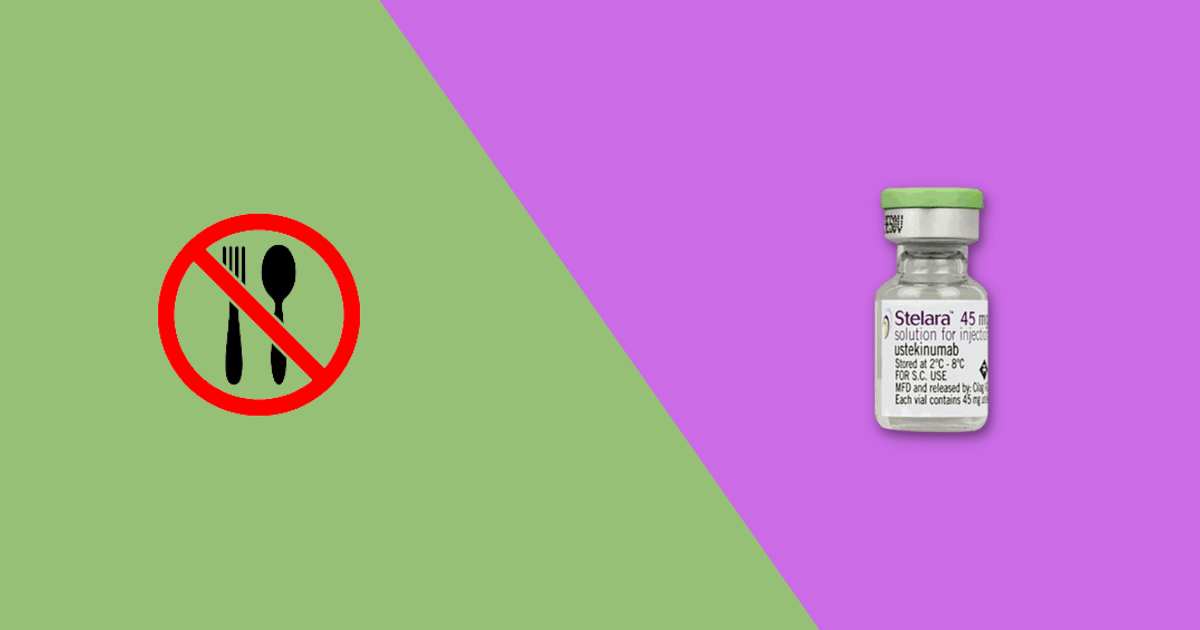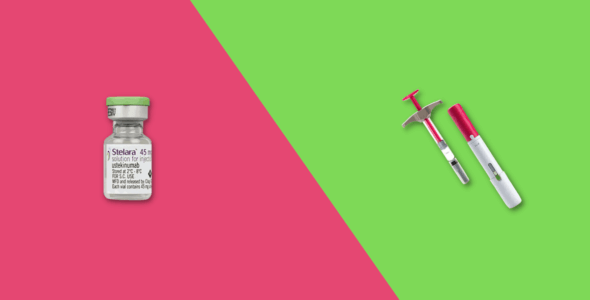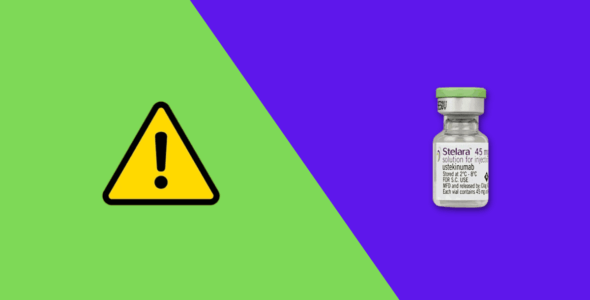What foods to avoid while on Stelara
Table of contents
Stelara may increase the risk of infections and it’s recommended to avoid uncooked or potentially contaminated foods while on this medication. There are also certain diet recommendations you can follow if you have plaque psoriasis, psoriatic arthritis, Crohn’s disease, or ulcerative colitis. Eating and avoiding certain foods can help with the symptoms of these medical conditions.
What is Stelara (ustekinumab)?
Stelara is a biologic drug that is FDA (U.S. Food and Drug Administration) approved to treat:
- plaque psoriasis in adults and some children
- psoriatic arthritis in adults
- Crohn’s disease in adults
- ulcerative colitis in adults
This medication belongs to a class of drugs called monoclonal antibodies. Biologics are made from living cells and work by targeting a specific protein involved in the overactive immune response that causes these conditions. It is manufactured by Janssen Biotech, Inc.
Over 425,000 patients in the United States have been treated with Stelara for Crohn’s disease and other medical conditions. Over 100,000 patients in the United States have been treated with Stelara for Crohn’s disease and ulcerative colitis.
The active ingredient in Stelara is ustekinumab, which is a human monoclonal antibody. Ustekinumab works by targeting and binding to two different proteins: interleukin (IL)-12 and IL-23. These are cytokines, which are involved in the overactive immune response that leads to plaque psoriasis, psoriatic arthritis, Crohn’s disease, and ulcerative colitis. By binding to these proteins, ustekinumab blocks their ability to bind to other cells and reduces the overactive immune response. This leads to a decrease in inflammation and the symptoms of these conditions.
The treatment starts with a one-time intravenous (IV) infusion through a vein in your arm that is administered by a medical professional. After the initial infusion, you will continue receiving the medication as an injection under the skin (subcutaneous injection) every 8 weeks. There are a total of 6 injections that are received during the first year of treatment.
What are the most common side effects of Stelara?
The most common side effects of Stelara include:
- nasal congestion
- sore throat
- runny nose
- upper respiratory infections
- fever
- headache
- tiredness
- itching
- nausea and vomiting
- redness at the injection site
- vaginal yeast infections
- urinary tract infections
- sinus infection
- bronchitis
- diarrhea
- stomach pain
- joint pain
Stelara is a prescription drug that affects your immune system and may lower your ability to fight infections that can increase your chances of having serious infections or side effects including certain types of skin cancer (especially for people with risk factors for skin cancer), tuberculosis (TB) and infections caused by bacteria, fungi, or viruses.
Serious allergic reactions can occur while taking Stelara. You should get medical help right away if you have any symptoms of a serious allergic reaction.
This is not a full list of all possible side effects of Stelara. Speak with your doctor about any side effects that you may experience while taking this medication.
Get your Stelara medication for only $49 per month
Get StartedWhat type of foods should I avoid while on Stelara?
Stelara may increase the risk of infections so people who take Stelara may be advised to take certain precautions to protect themselves, such as avoiding uncooked or potentially contaminated foods. As well, infection with salmonella as a result of eating undercooked meat, poultry and eggs could be more serious for some people that are taking Stelara.
While there are no specific foods that cannot be eaten while on Stelara, there are certain diet recommendations you can follow depending on your medical condition.
If you have any questions about the best diet for your condition, get medical advice from your healthcare professional or speak with a registered dietitian.
Diet recommendations for plaque psoriasis
Plaque psoriasis is an autoimmune disease that causes raised, red, scaly patches on the skin. If you have plaque psoriasis, you may want to avoid certain foods that can worsen your symptoms. Cutting back on these foods can help improve your psoriasis symptoms and overall health.
Foods to avoid with plaque psoriasis
- Alcohol
- Dairy
- Refined carbohydrates (for example white bread, pasta, white rice, pastries, and some breakfast cereals)
- Saturated fats and trans fats (for example, red meat, fried food, cheese, fast food, margarine, and many other processed snacks)
- Sugary foods (for example, fruit juices, soda, baked goods, candy, artificial sweeteners such as aspartame, and other sweets that are high in added sugar)
- High-gluten foods
Best foods to eat with plaque psoriasis
- Fish, lean protein, or plant-based proteins such as tofu or tempeh
- Fruits and vegetables
- Legumes (lentils and beans)
- Seeds and nuts
- Olive oil
- Small amounts of low-fat dairy
- Whole grains
Diet recommendations for psoriatic arthritis
Psoriatic arthritis is a form of arthritis that affects some people who have psoriasis. If you have psoriatic arthritis, you may want to avoid certain foods that can worsen your symptoms. Some foods can make your psoriatic arthritis symptoms worst.
Foods to avoid with psoriatic arthritis
- Red meat
- Dairy (consider eating low-fat dairy in moderation if you do not have an intolerance or allergy, or alternatives such as almond milk, soy milk, coconut milk, hemp milk, or flax milk)
- Processed foods
Best foods to eat with psoriatic arthritis
- Fish
- High-antioxidant fruits and vegetables
- Seeds and nuts
- Olive oil
- Beans
- High fiber whole grains
- Nightshade vegetables (for example, eggplant, tomatoes, red bell peppers, and potatoes)
You can also consider any of the following diets:
- Keto diet
- Gluten-free diet
- Paleo diet
- Mediterranean diet
- Low-FODMAP diet
- Leaky gut diet
- Pagano diet
- AIP diet
- DASH diet
Diet recommendations for Crohn’s disease
Chron’s disease is an inflammatory bowel disease that can cause symptoms like abdominal pain, diarrhea, fatigue, and weight loss. Cutting back on certain foods can help improve your Crohn’s disease symptoms and overall health.
It is recommended to eat four to six meals daily, stay hydrated, and drink slowly. Use simple cooking techniques such as boiling, grilling, steaming, and poaching.
Foods to avoid with Crohn’s disease
- Whole grains (for example, whole-wheat pasta, whole-grain bread, popcorn, and bran)
- Beans
- High-fiber fruits and vegetables (especially raw fruits and vegetables including cruciferous vegetables such as broccoli, cauliflower, or anything with a peel)
- Nuts and seeds
- Alcohol
- Caffeine
- Sugar alcohols (for example, sweeteners used in sugarless gum, candy, and some drinks)
- High-sugar drinks (for example, fruit juice and soda)
- Dairy (for example, whole milk, cream cheese, soft cheese, ice cream, and sour cream)
- Spicy foods (for example, chili powder, spicy curries, and cayenne pepper)
- Greasy, fried, and fatty foods (for example, sausage, salami, butter, coconut, margarine, and cream)
Best foods to eat with Crohn’s disease
- Fiber-rich foods such as oat bran, beans, barley, nuts, and whole grains
- Protein such as lean meats, fish, eggs, nuts, and tofu
- Fruits and vegetables that you can remove the peel and seeds
- Calcium-rich foods such as collard greens, yogurt, and kefir
- Food with probiotics such as yogurt, kimchi, miso, sauerkraut, and tempeh
Diet recommendations for ulcerative colitis
Ulcerative colitis is a type of inflammatory bowel disease that causes intense periods of abdominal discomfort, diarrhea, and a loss of appetite. Eating certain foods and cutting back on certain foods can help improve your ulcerative colitis symptoms and reduce the risk of flares and inflammation.
Foods to avoid with ulcerative colitis
- Alcohol
- Caffeine
- Dairy products
- Carbonated drinks
- High-fiber foods (for example, dried beans, fruits, whole grains, berries, peas, and legumes)
- Popcorn
- Potatoes
- Fatty meats
- Nuts and seeds
- Sugar alcohols (for example, sweeteners used in sugarless gum, candy, and some drinks)
- Fructose sugar (for example, high-fructose corn syrup, fruit juice, honey, and molasses)
- Gluten
- Spicy foods
- Raw stringy vegetables (for example, celery and other gas-producing vegetables including cabbage, brussels sprouts, and broccoli)
Best foods to eat with ulcerative colitis
- Applesauce
- Salmon
- Squash
- Avocados
- Some fermented foods (for example, yogurts, containing active probiotics)
- Instant oatmeal with no additional flavoring
- Refined grains (for example, pasta, bread, and cereal made from refined grains)
- Eggs
Who can use Stelara?
Stelara is a biologic prescription drug used to treat:
- adults over 18 years of age and children 6 years of age and older with moderate to severe psoriasis who may benefit from taking injections or pills (systemic therapy) or phototherapy (treatment using ultraviolet light alone or with pills)
- adults over 18 years of age with active psoriatic arthritis
- adults over 18 years of age with moderately to severely active Crohn’s disease
- adults over 18 years of age with moderately to severely active ulcerative colitis
Only use this medication exactly as prescribed by your doctor. Stelara is intended for use under the guidance and supervision of your healthcare provider.
In children 6 years of age and older, it is recommended that this medication only be administered by a healthcare provider.
Do not inject Stelara on your own unless your healthcare provider decides that you or a caregiver may administer your injections for you at home. You should first receive training on how to prepare and inject Stelaraa.
Your healthcare provider will prescribe the right dose of Stelara for you to take, the amount to be used for each injection, and the frequency for you to receive this medication.
Do not take Stelara if you:
- have cancer, posterior reversible encephalopathy syndrome (PRES), or lung inflammation
- have ever had an allergic reaction to Stelara or to any of the active ingredients
- are allergic to latex (the needle cover on the Stelara prefilled syringe contains latex)
- have recently received or are planning to receive a vaccine (immunization)
- have any new or changing lesions within psoriasis areas or on normal skin
- have received or are receiving any allergy shots
- have received or are receiving phototherapy for your psoriasis
- are pregnant or plan to become pregnant as it’s not known if this medication could harm your unborn baby
- are breastfeeding or plan to breastfeed as the medication passes into your breastmilk
Before starting to take this medication, tell your doctor if you have an infection or symptoms such as:
- fever, sweats, or chills
- muscle aches
- cough
- shortness of breath
- blood in phlegm
- weight loss
- warm, red, or painful skin or sores on your body
- stomach pain
- diarrhea
- burning when you urinate or urinating more often than usual
- feeling very tired
You should tell your healthcare provider about all the medications you take, including prescription drugs and over‐the‐counter products, vitamins, and herbal supplements.
Can I take Stelara with other medications?
There are no known interactions between Stelara and other medications. It can be used alone or with methotrexate. However, as with all medications, it is always best to speak with your healthcare provider before starting or stopping any medication.
You cannot receive a live vaccine while taking Stelara. Before taking Stelara, tell your healthcare provider if you have recently received or are planning to receive an immunization (vaccine). As well, tell your healthcare provider if anyone in your house needs a vaccine as the viruses that are used in some types of vaccines could spread to people with a weakened immune system which may cause serious problems. For one year before and after taking Stelara, you should also not receive the BCG vaccine.
Can I take vitamin D with Stelara?
Yes, you can take vitamin D with Stelara. Vitamin D is a nutrient that helps keep your bones healthy and strong. It is important to get enough vitamin D, especially if you have Crohn’s disease or ulcerative colitis, as these conditions can make it difficult to absorb this nutrient from food.
You can get vitamin D from food, such as fatty fish, eggs, and fortified milk. You can also get vitamin D from supplements or exposure to sunlight.
If you have any questions about the best way to get vitamin D, speak with your healthcare provider or registered dietitian.
Medically reviewed
A medical professional has reviewed this article.


Jamie Winn, PharmD
Jamie Winn, PharmD
Dr. Jamie Winn received his Doctor of Pharmacy in 2002 from the University of South Carolina College of Pharmacy, Columbia, SC. Jamie is a medical reviewer for NiceRx.




